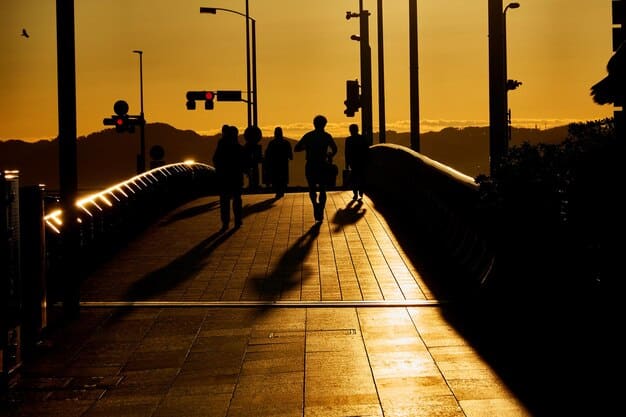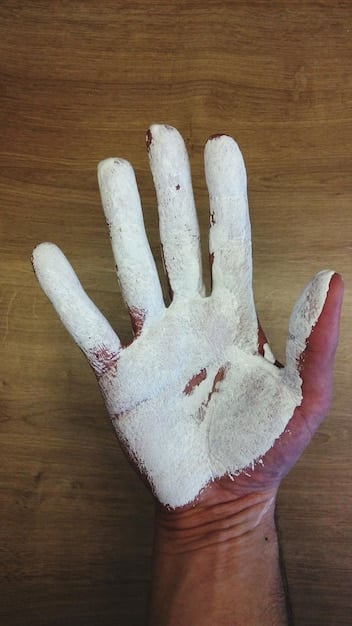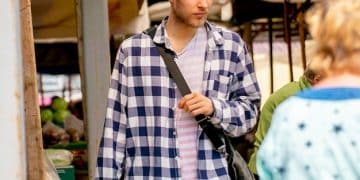The Dark Side of Travel: How to Avoid Human Trafficking

Human trafficking is a severe crime that exploits vulnerable individuals, and travelers must be aware of the risks, signs, and preventive measures to avoid becoming victims or unknowingly supporting this criminal industry.
The allure of travel often blinds us to potential dangers lurking beneath the surface. One of the most insidious of these is the dark side of travel: understanding and avoiding human trafficking, a global issue that preys on the vulnerable and unsuspecting.
Understanding the Scope of Human Trafficking
Human trafficking is a grave violation of human rights, affecting millions worldwide. It’s crucial for travelers to understand the scale and nature of this crime to recognize potential risks and act responsibly.
What is Human Trafficking?
Human trafficking involves the recruitment, harboring, transportation, provision, or obtaining of a person through force, fraud, or coercion for the purpose of exploitation.
Who are the Victims?
Victims can be anyone, regardless of age, gender, or nationality. However, certain groups are more vulnerable, including migrants, refugees, and those living in poverty. Children are particularly at risk.

Understanding these facts helps us grasp the urgency and significance of addressing this issue. Staying informed is the first step in protecting ourselves and others.
- Traffickers often target individuals with vulnerabilities.
- Many victims are lured with false promises of employment or a better life.
- Human trafficking occurs in various forms, including sex trafficking and forced labor.
In conclusion, recognizing the scope of human trafficking is essential for responsible travel. By understanding the nature of the crime and who is at risk, we can take steps to protect ourselves and others.
Common Trafficking Scenarios for Travelers
Travelers can encounter human trafficking in various forms and locations. Being aware of these scenarios is crucial for recognizing potential danger signs and taking appropriate precautions.
Unsafe Accommodation
Be cautious of accommodations that seem too good to be true or are located in areas known for criminal activity. Look for hotels and rentals with good security measures and positive reviews.
Transportation Risks
Exercise caution when using informal transportation services or accepting rides from strangers. Stick to reputable taxi services or public transportation.
Recognizing these scenarios will equip you to identify potential risks and take proactive steps for personal safety.
- Watch out for individuals who seem controlled or intimidated by others.
- Be wary of situations where someone else controls your documents or finances.
- Stay vigilant in areas with high tourist traffic.
In short, being aware of how trafficking can occur during travel will help you stay vigilant and protect yourself, and recognizing the signs is the first step in preventing this type of exploitation.
Recognizing the Signs of Human Trafficking
Identifying the signs of human trafficking is crucial in order to help potential victims. Being able to recognize indicators of exploitation can allow you to report suspicious activity and possibly save lives.

Physical and Psychological Indicators
Look for signs of physical abuse, neglect, or malnourishment. Victims may also exhibit signs of fear, anxiety, or depression.
Lack of Freedom
Victims often have limited freedom of movement or are under constant surveillance. They may be unable to speak freely or make independent decisions.
Vigilance is key when it comes to recognizing the signs. If something doesn’t feel right, it’s important to trust your instincts.
- Look for inconsistencies in a person’s story or behavior.
- Be aware of individuals who seem to be working against their will.
- Report any suspicions to local authorities or anti-trafficking organizations.
In conclusion, recognizing the signs of human trafficking is essential for protecting vulnerable individuals. Stay alert, trust your instincts, and report any suspicious activity immediately.
Safety Measures to Avoid Becoming a Victim
Prevention is key to protecting yourself from human trafficking. It’s important to take proactive steps to minimize risks and stay safe while traveling.
Research Your Destination
Before traveling, research your destination for areas known for high crime rates or human trafficking. Stay informed about local laws and customs.
Secure Your Documents and Finances
Keep your passport, identification, and travel documents in a safe and secure location. Be cautious when sharing personal information with strangers.
Taking these precautions can significantly reduce your vulnerability and ensure a safer travel experience.
- Avoid traveling alone in high-risk areas.
- Trust your instincts and remove yourself from uncomfortable situations.
- Have a plan for emergencies and know how to contact local authorities.
In short, following safety measures is essential for reducing the risk of becoming a human trafficking victim. Being informed, cautious, and proactive can help ensure your safety while traveling.
How to Report Suspected Trafficking
If you suspect someone is a victim of human trafficking, it’s crucial to report it to the appropriate authorities. Knowing how and where to report can help save lives.
Contact Local Law Enforcement
Report any suspicions or concerns to the local police or law enforcement agencies. Provide as much detail as possible, including descriptions of individuals, locations, and activities.
Reach Out to Anti-Trafficking Organizations
Contact anti-trafficking groups for guidance and support. These organizations can provide assistance and resources to victims.
Your report can make a significant difference in the fight against this crime, by taking swift action and offering clear information.
- Do not attempt to intervene directly, as it could put yourself or the victim at risk.
- Provide accurate and reliable information to authorities.
- Follow up on your report to ensure it is being investigated.
In conclusion, reporting suspected trafficking is a critical step in combating this crime. By taking action and providing information, you can help protect vulnerable individuals and support law enforcement efforts.
The Role of the Travel Industry in Combating Trafficking
The travel industry has a crucial role to play in preventing and combating human trafficking. By raising awareness and implementing preventative measures, these businesses can contribute to making travel safer for everyone.
Training Staff
Educate staff on how to recognize and report potential trafficking situations. Hotels, airlines, and tour operators can train employees to identify signs of exploitation.
Partnerships and Initiatives
Collaborate with anti-trafficking organizations to develop and implement preventative programs. Support initiatives that raise awareness within the travel industry.
These collaborative measures can lead to a significant impact in the fight against trafficking.
- Promote ethical tourism practices that respect human rights.
- Support sustainable employment opportunities in local communities.
- Advocate for stronger laws and regulations to combat trafficking.
In short, the travel industry plays a vital role in combating human trafficking. By educating staff, partnering with organizations, and promoting ethical practices, the industry can contribute to a safer and more responsible travel environment.
| Key Point | Brief Description |
|---|---|
| ⚠️ Recognize Signs | Look for physical, psychological, and situational indicators of trafficking. |
| 🛡️ Safety Measures | Secure documents, research destinations, and avoid risky situations. |
| 📞 Report Suspicion | Contact local law enforcement or anti-trafficking organizations. |
| 💼 Industry Role | Travel industry must train staff and support anti-trafficking initiatives. |
Frequently Asked Questions
▼
Human trafficking is the recruitment, harboring, transportation, provision, or obtaining of a person through force, fraud, or coercion for the purpose of exploitation.
▼
Migrants, refugees, and those living in poverty are particularly at risk. Children are also highly vulnerable, regardless of background.
▼
Physical abuse, fear, lack of freedom, and inconsistencies in stories are potential indicators of human trafficking. If something seems off, trust your instincts.
▼
Contact local law enforcement or anti-trafficking organizations. Provide as much detail as possible without intervening directly to avoid endangering yourself or the victim.
▼
The travel industry can train staff, partner with anti-trafficking organizations, and promote ethical tourism practices to raise awareness and prevent exploitation.
Conclusion
Staying informed, vigilant, and proactive are essential steps in avoiding the dark side of travel: understanding and avoiding human trafficking. By recognizing the signs, taking safety measures, and reporting suspicions, we can all contribute to making travel safer and protecting vulnerable individuals from exploitation.





